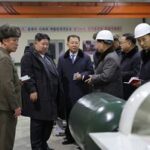Global Security Concerns Rise as Russia Exits CFE Treaty, NATO Responds with Suspension
Eugene Park Views
Russia “circumvents treaty due to NATO expansion policy.”
The U.S. and NATO also respond with ‘suspending treaty obligations’… international security under a cloud.
|
Russia’s announcement that it will formally withdraw from the Treaty on Conventional Armed Forces in Europe (CFE) has led NATO to declare a halt to the agreement. This move intensifies the global security crisis as disarmament agreements between the U.S. and Russia, established after the Cold War, are successively invalidated.
According to Reuters, the Russian Foreign Ministry announced on the 7th (local time) that “as of midnight today, Russia’s CFE withdrawal procedure has been completed.” The ministry emphasized that due to NATO’s expansion policy, this situation has arisen, and “from today, Russia and NATO member countries can’t reach any disarmament agreement.”
The CFE is a disarmament treaty signed at the end of the Cold War 1990 between NATO and the Warsaw Pact led by the Soviet Union. It imposed limits on the inventory and quantity of conventional weapons such as tanks, fighter jets, armored vehicles, and artillery. Conventional weapons pose a significant risk for rapid attacks, and the treaty served as a mechanism to prevent the augmentation of forces by the Cold War parties. It is widely recognized as weakening the Soviet Union’s superiority in conventional weapons.
Russia has recently criticized the U.S. for openly bypassing treaty restrictions by expanding NATO, including Finland’s membership and Sweden’s application for membership. The Russian Foreign Ministry pointed out that “attempts to ensure Europe’s military security without considering Russia’s interests will not result in any beneficial outcomes for those who led them.”
The ministry also noted that while Russia ratified the revised CFE in 1999, other member countries, including the U.S., have postponed ratification, demanding the withdrawal of Russian forces from Moldova and Georgia. They described this as a situation where “even the formal preservation of the CFE is not feasible from the perspective of Russia’s fundamental security interests.”
In response to Russia’s decision to withdraw from the treaty, NATO condemned the move as damaging to the security of Europe and the Atlantic. It declared an official suspension of the CFE.
NATO stated that “it is unsustainable for the Allies to comply with the treaty while Russia does not” and “will suspend the effectiveness of the CFE for the necessary period by international law rights.” It was also explained that all NATO allies support this decision.
Jake Sullivan, U.S. National Security Advisor, also stated that “the U.S. will suspend its obligations under the CFE from December 7, by international law rights.” Sullivan noted that Russia’s invasion of Ukraine and withdrawal from the CFE fundamentally changed the situation, and “the suspension of the CFE will enhance the alliance’s deterrence and defense capabilities by removing restrictions on planning, deployment, and training of conventional weapons.”
Since the outbreak of the Ukrainian war in February last year, Russia has withdrawn from the New START nuclear arms control treaty with the U.S. and also removed its ratification of the Comprehensive Nuclear Test Ban Treaty (CTBT). Experts are concerned that the world could re-enter an unlimited arms race as various disarmament treaties become ineffective one after another.
By. Seon Miri
















Most Commented